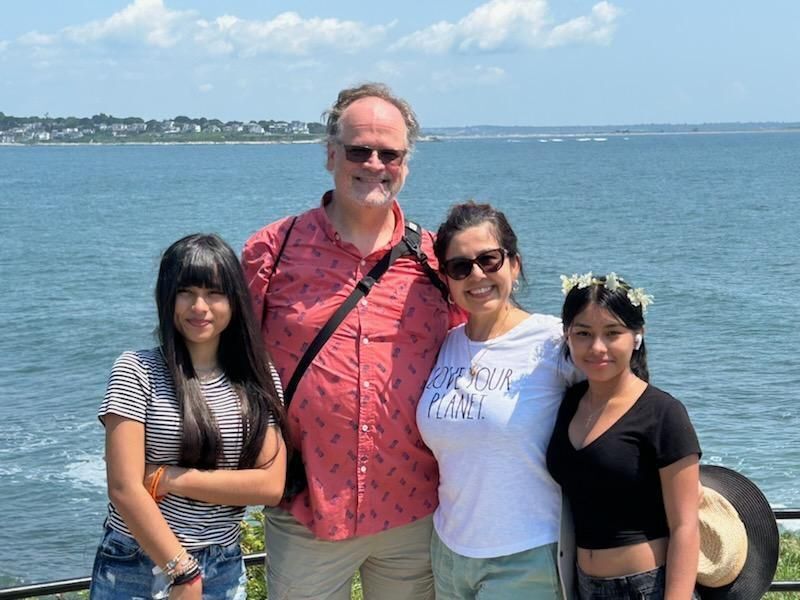
This September, we’re marking a significant milestone for Lutheran Social Services of the National Capital Area (LSSNCA) as we celebrate 50 years of providing care for unaccompanied refugee minors (URM). Since resettling a 10-year-old child from Cambodia in 1974 - who needed life-saving surgery - LSSNCA has been dedicated to providing support and stability to youth who arrive in the United States without parents or legal guardians.
LSSNCA’s foster care programs ensure eligible unaccompanied refugee children receive the full range of assistance, care, and services available to all foster children in Virginia and Washington, D.C. The organization is also authorized to place children in Maryland for the D.C. program.
This month, we’re sharing the story of Susan, a dedicated foster parent in Maryland. We talked with her about what inspired her to become a foster parent and how the experience has been so far.
Susan’s journey into fostering began in 2016 with an 18-year-old girl from Guatemala, initially intended to be a short-term arrangement. However, the bond they formed was so strong that the young woman stayed with Susan until she was ready and able to start a life of her own. Susan recalls, “I spoke Spanish, which helped us connect. Unbeknownst to me, she [was] pregnant, and it was a joyful experience to take on a grandmother’s role. We have maintained our relationship, and she remains a cherished part of my life.”
After getting married, Susan’s desire to foster a child remained steadfast. “I started thinking about welcoming another child into our home, but my husband was hesitant,” Susan recalls. When a friend shared a poster for the LSSNCA foster care program, the conversation was back on the table, and Susan and her husband decided to attend the preparation class together.
Two months later, in January 2022, Susan and her husband welcomed their first foster child through LSSNCA—Alexandria, a 12-year-old girl from Honduras who spoke only Spanish. Susan’s proficiency in Spanish proved invaluable, facilitating smooth communication as Alexandria settled into her new home. “She came in carrying only a small bag of clothes and a plate of food made by her aunt. Her living conditions prior to coming to us had been challenging, and she was thrilled to have her own room in our home," Susan explains.
Susan’s priority was to create a safe and nurturing environment for Alexandria. Over time, Alexandria began to open up, showing eagerness to learn English and excel in school. Susan and her husband offered the guidance and support she needed to help her thrive and eventually became her legal guardians.
“Watching her grow has been remarkable. I think we initially overlooked the fact that she was also turning 13 and navigating adolescence. It was a period of adjustment for all of us,” Susan reflects, acknowledging the difficulties that come with raising a teenager.
As time went by, Susan recognized that Alexandria might benefit from having a peer who shared a similar experience, so they decided to welcome another child into their home.
“I noticed that she felt a little lonely. We live in the suburbs with not many people who look like her. Besides, we had two beds, so we decided to welcome a new child,” shares Susan.
In November 2023, they welcomed 16-year-old Stephanie from Honduras. She had no family in the U.S. and didn't speak any English, having only attended first grade before dropping out at age 6 to work. Enrolling her in school proved challenging, but she “demonstrated a strong desire for education.” Susan continues, “she needed a lot more attention and one-on-one time than I expected, given her age. I assumed that at 16, she would want to be more independent, but her circumstances were different.”
Alexandria and Stephanie bonded over their shared experiences immediately. Having navigated a similar path, Alexandria was keen on supporting Stephanie with school and adjustments to a new environment. “Both girls are adapting to their new lives, but they miss aspects of their home countries, such as bathing in rivers and picking food from farms. Despite this, they appreciate having a family and a safe, stable environment. They face typical teenage desires, such as wanting the latest Nike shoes and iPhones. Like any parent of teenagers, we deal with these challenges while also supporting their individual dreams,” Susan says.
Alexandria, who is now 15, aspires to become a nurse, while Stephanie, who is now 17, wants to become a cook and eventually get married. Stephanie’s early years of self-reliance have shaped her outlook on life, and Susan encourages her to embrace her childhood, despite her inclination to take on adult responsibilities.
For anyone considering fostering, Susan’s advice is “to approach it with an open heart and compassion.’” She believes that fostering not only supports the growth and well-being of children but also strengthens communities. “I have seen profound changes as the girls began to trust us and recognize our home as a safe space. Personally, this journey has taught me about unconditional love and strengthened my faith. My husband has embraced his role, taking leadership in various aspects of parenting, and we both find fulfillment in our family life,” reflects Susan.
Currently LSSNCA has 33 licensed foster care families across the D.C. metro area, but the needs are much greater. Consider how you might contribute to this meaningful work, by becoming a foster parent. By fostering, you contribute to the growth and well-being of children and help them embrace their childhood. Not able to foster a child at this moment? Consider donating today to help children and youth get essential services.
